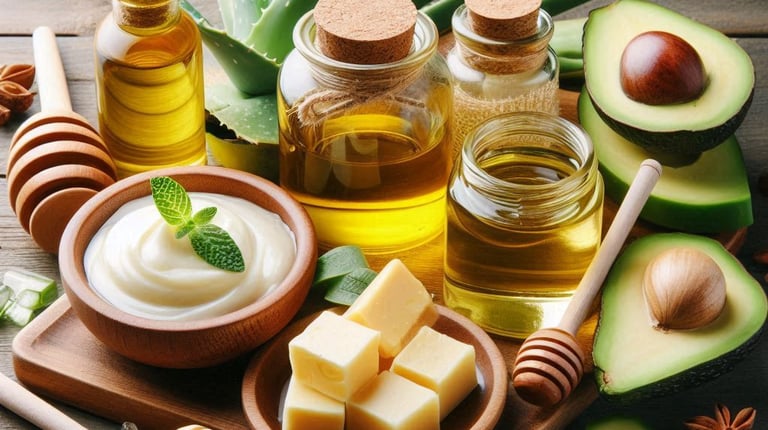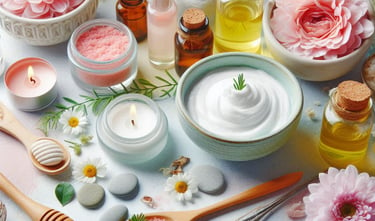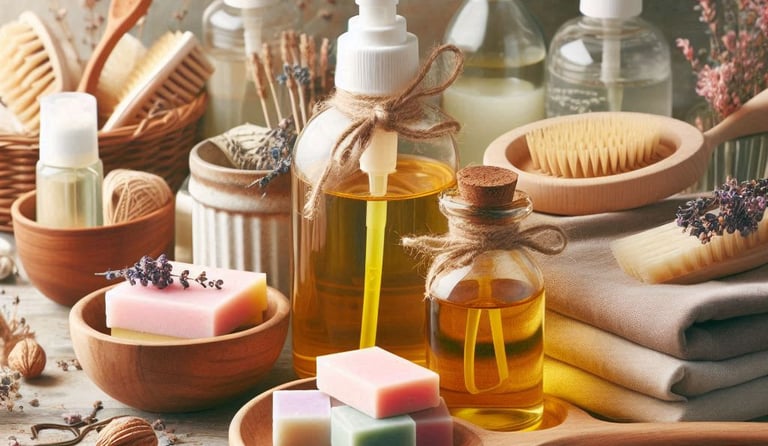7 All-Natural Solutions for Dry Skin: Say Goodbye to Harsh Chemicals
Discover 7 all-natural solutions to soothe and hydrate dry skin. From nourishing DIY remedies to must-have products, achieve healthy, glowing skin naturally. 🌿
SKINCARE
Kathrine-Anne Hill
9/15/20246 min read


Affiliate Disclaimer:
Please note that some of the links in this article are affiliate links. This means that if you click on these links and make a purchase, I may receive a small commission at no additional cost to you. This commission helps support the maintenance and growth of this website and allows me to continue providing valuable information and recommendations. Rest assured, I only recommend products and services that I have personally used or thoroughly researched. Your support is greatly appreciated! “As an Amazon Associate I earn from qualifying purchases.” For full disclosure see our Privacy Policy and Terms and Conditions here.
Understanding Dry Skin and Its Causes
Dry skin, also known as xerosis, is a prevalent skin condition marked by insufficient moisture in the outer layer of the skin. This can result in symptoms like flakiness, itching, and irritation. Recognizing the common causes of dry skin is crucial for effectively addressing the issue, enabling individuals to pinpoint potential triggers and take proactive steps to relieve their discomfort.
One major factor contributing to dry skin is environmental conditions. For example, seasonal changes can have a significant impact; colder months often bring lower humidity levels, leading to increased skin dryness. Similarly, extended exposure to hot and dry climates can deplete the skin's moisture. Additionally, frequent hot showers or baths can worsen the situation by stripping away the natural oils that safeguard the skin's barrier.
Furthermore, lifestyle choices play a key role in maintaining skin hydration. A diet lacking in essential fatty acids, vitamins, and minerals can impair the skin's ability to retain moisture effectively. Including foods rich in omega-3 fatty acids, such as fish and flaxseeds, can enhance skin health and hydration. Another important factor is hydration; not drinking enough water can cause dryness not just on the skin's surface but also from within. A balanced approach to hydration is essential for optimal skin function.
Identifying the signs and symptoms of dry skin is crucial for determining the appropriate course of action. Individuals should look out for signs like tightness, flaky skin, and redness, which may indicate the need for intervention. By understanding the underlying causes and recognizing these symptoms, individuals can gain insight into their skin's needs and explore safe, natural solutions to effectively tackle the issue.
The Benefits of Natural Remedies for Dry Skin
In recent years, more people have become aware of the significance of skincare ingredients. Many are now opting for natural remedies for dry skin as they look for alternatives to harsh chemical-based products. Natural solutions, sourced from plants and other natural materials, provide numerous benefits by combining hydration with nourishment, ultimately improving overall skin health.
One of the main advantages of natural remedies is their ability to moisturize without adding toxic substances that are often found in synthetic products. Ingredients like shea butter, coconut oil, and aloe vera are well-known for their ability to deeply hydrate while remaining gentle on the skin. These natural oils are packed with fatty acids and vitamins that aid in skin repair, leaving it feeling soft and supple. Unlike conventional products, which can worsen dryness or cause allergic reactions, natural remedies are generally more compatible with the skin’s natural functions, thus lowering the chances of irritation.
Moreover, natural ingredients frequently have anti-inflammatory properties that can effectively soothe irritated skin. For example, aloe vera not only provides hydration but also helps reduce redness and discomfort, making it a fantastic option for those dealing with dry skin issues. Additionally, the beneficial compounds in these remedies work harmoniously with the skin, promoting a more holistic approach to skincare that emphasizes overall well-being.
Furthermore, choosing natural remedies supports a more environmentally friendly lifestyle. Many natural products are sustainably sourced and free from harmful chemicals, enabling consumers to engage in eco-conscious practices. Therefore, switching to natural solutions is not only advantageous for the skin but also reflects a commitment to health and the environment.
In summary, focusing on natural remedies presents a safe, effective, and sustainable way to address dry skin. By incorporating these alternatives into their daily skincare routines, individuals can enhance their skin health while making a positive impact on the planet.
To restore moisture and repair your skin's natural barrier, consider using Three Ships Replenish Ceramides Blueberry Barrier Repair Serum. Packed with ceramides and antioxidant-rich blueberry extract, this all-natural formula helps lock in hydration and soothe dryness, making it a perfect addition to your skincare routine.
Top 7 Dry Skin Natural Solutions
Dry skin is a common issue that can cause discomfort and a lackluster appearance. Thankfully, there are several all-natural remedies that can effectively address this problem by delivering essential moisture without relying on harsh chemicals. Here are seven natural solutions that can hydrate and nourish your skin, helping it regain its softness and elasticity.
1. Shea Butter: This rich, creamy substance comes from the nuts of the shea tree and is well-known for its deep moisturizing abilities. Packed with fatty acids and vitamins A and E, shea butter is perfect for softening dry skin. To use it, apply a small amount to the affected areas after showering to seal in moisture.
2. Coconut Oil: Renowned for its versatility, coconut oil contains lauric acid, which has antibacterial properties that help shield the skin from irritants. Its thick texture makes it a fantastic moisturizer. Warm a small amount in your hands and massage it into your skin, focusing on drier areas like elbows and knees.
3. Aloe Vera: This succulent plant is famous for its soothing properties and its ability to hydrate the skin. Aloe vera gel can provide instant relief from dryness and irritation. Simply apply fresh aloe vera gel directly to dry patches to experience its cooling and healing effects.
4. Honey: As a natural humectant, honey draws in and retains moisture in the skin. Its anti-inflammatory properties also aid in healing and soothing irritated areas. Use honey as a face mask once a week by spreading a thin layer and rinsing it off after 20 minutes.
5. Jojoba Oil: With a structure similar to human sebum, jojoba oil is easily absorbed, making it an excellent moisturizer for dry skin. It helps balance oil production while providing hydration. For optimal results, apply a few drops to your face or body after cleansing.
6. Avocado: Loaded with fatty acids, vitamins, and essential nutrients, avocado can deeply nourish and moisturize dry skin. Mash a ripe avocado and use it as a mask for 15-20 minutes before rinsing it off with warm water.
7. Oatmeal: Colloidal oatmeal is known for its soothing properties and can help relieve dry, itchy skin. Add it to your bath or create a paste with water to apply directly to affected areas for relief.
Finish your dry skin care routine with RaGaNaturals Lavender Body Lotion, a soothing blend of natural shea butter, argan oil, vitamin E, and avocado oil. This luxurious lotion not only deeply moisturizes but also leaves your skin feeling soft and lightly scented with calming lavender.
Tips for Maintaining Healthy Hydrated Skin
Maintaining healthy and hydrated skin goes beyond just using natural remedies; it requires a comprehensive approach that includes various lifestyle habits. One of the most important strategies is ensuring proper hydration. Drinking enough water each day not only benefits your overall health but also plays a key role in keeping your skin hydrated. Aim for at least eight glasses a day, and consider increasing this amount during warmer months or after exercising. Additionally, including foods with high water content, like cucumbers and watermelon, can further enhance skin hydration.
Another crucial aspect is adopting a balanced diet that is rich in essential fatty acids. Foods such as avocados, nuts, fish, and flaxseeds can greatly improve skin health by strengthening its barrier function and promoting moisture retention. Omega-3 and Omega-6 fatty acids are especially beneficial, as they can help reduce inflammation and keep the skin soft. Pair this with a diet full of fruits and vegetables, which provide vital vitamins and antioxidants, enhancing the skin’s ability to cope with environmental stressors.
Furthermore, adjusting your skincare routine to match seasonal changes is essential. In colder months, using richer creams can offer extra nourishment and combat dryness, while lighter products may be more appropriate for summer. Be aware of environmental factors like pollution and sun exposure, which can negatively affect skin health. Taking protective measures, such as wearing hats or applying natural sunscreens, is important.
Lastly, think about incorporating regular gentle exfoliation into your routine to eliminate dead skin cells, allowing for better absorption of nourishing products. By following these strategies, you can achieve long-term benefits, helping to prevent dryness and ensuring your skin remains healthy and hydrated naturally.







